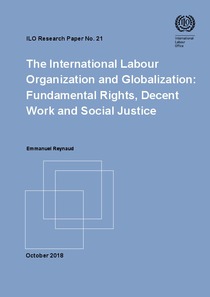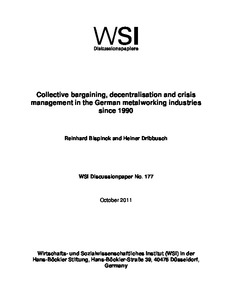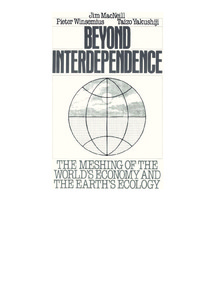-
1by Leopold, Ellen“…In Under the Radar, Ellen Leopold shows how nearly every aspect of our understanding and discussion of cancer bears the imprint of its Cold War entanglement. The current biases toward individual rather than corporate responsibility for rising incidence rates, research that promotes treatment rather than prevention, and therapies that can be patented and marketed all reflect a largely hidden history shaped by the Cold War. …”
Published 2008
TEXT -
2
-
3
-
4by Pavilack, Jody“…Pavilack carries the story through the end of World War II, when a centrist president elected with crucial Communist backing brutally repressed the coal miners and their families in what has become known as the Great Betrayal, ushering Cold War politics into Chile with force. The patriotic fervor and tragic outcome of the coal miners’ participation in Popular Front coalition politics left an important legacy for those who would continue the battle for greater social justice in Chile in the coming decades."…”
Published 2011
TEXT -
5
-
6by Anderson, Perry“…"This book offers a magisterial analysis of Europe's development since the end of the Cold War. A major work of modern history and political analysis, "The New-Old World" punctures both domestic and American myths about continental Europe. …”
Published 2011
TEXT -
7Published 2017“…yearbook 2018 examines who actually voted for the populist right in France and Austria and reviews the evolution of the European project from the Cold War through the end of east-west system competition and Maastricht’s establishment of economic governance. …”
TEXT -
8Published 2009“…This was the biggest EU enlargement ever and a historic step towards unifying Europe after decades of Cold War division. Communication COM(2009) 79 final."…”
TEXT -
9by Reynaud, Emmanuel“…"This paper discusses how the ILO reacted to the challenges to its raison d’être posed by the end of the Cold War and the new globalization era. It shows that its continued relevance was attained in three main stages: the adoption of the 1998 Declaration, the development of the “decent work” concept and the adoption of the 2008 Declaration. …”
Published 2018
TEXT -
10by Pelz, William A.“…The German peasant wars of Thomas Müntzer, the bourgeois revolutions of the eighteenth century, the rise of the industrial worker in England, the turbulent journey of the Russian Soviets, the role of the European working class throughout the Cold War, student protests in 1968 and through to the present day, when we continue to fight to forge an alternative to the barbaric economic system. …”
Published 2016
TEXT -
11by Hardy, Jane“…"Poland was central to the historic changes that took place across Eastern Europe at the end of the Cold War. It is the largest economy in the region, and was at the forefront of opposition to communism, with the rise of Solidarity in the 1980s. …”
Published 2009
TEXT -
12“…The profound changes which underwent collective bargaining in M+E over the last two decades have to be regarded against the background of a new global and national political and economic environment which emerged after the end of the Cold War. The M+E sector with at its core the automobile industry underwent successive waves of restructuring which shaped the bargaining agenda. …”
TEXT -
13Published 2011“…Their comparative studies of center-left politics in Scandinavia, France, Germany, southern Europe, post–Cold War Central and Eastern Europe, the United Kingdom, and the United States emphasize differences in the goals of left political parties and in the political, economic, and demographic contexts in which they operate. …”
TEXT -
14Published 2010“…Bringing together internationally acknowledged authorities as well as younger researchers, all specialists in their field, it ranges across Europe and from the late nineteenth century to the beginnings of the Cold War. National histories are revisited through transnational perspectives - on Britain, France, Italy, Germany, Poland or Europe as a whole - evidencing a great wealth of cross-border interactions and reciprocal influences between regions and countries. …”
TEXT -
15by Zierler, David“…Incorporating in-depth interviews, unique archival collections, and recently declassified national security documents, Zierler examines the movement to ban ecocide as it played out amid the rise of a global environmental consciousness and growing disillusionment with the containment policies of the cold war era."…”
Published 2011
TEXT -
16by Zielonka, Jan“…It suggests a novel way of thinking about the European Union and the process of European integration, showing “two Europes” coming together following the end of the Cold War. It proposes a system of economic and democratic governance that meets the ever greater challenges of modernization, interdependence, and globalization. …”
Published 2006
TEXT -
17by Ther, Philipp“…A compelling and often-surprising account of how the new order of the New Europe was wrought from the chaotic aftermath of the Cold War, this is essential reading for understanding Europe today."…”
Published 2016
TEXT -
18“…The world economy and political system have changed dramatically since the 1987 book was published. The end of the Cold War has unleashed new economic and political forces, and new regionalisms have emerged. …”
TEXT -
19by Melman, Seymour“…In After Capitalism he explores a growing trend in capitalist systems worldwide: workplace democracy. The end of the Cold War in 1991 inspired an unprecedented outburst of triumphalist rhetoric among proponents of unfettered capitalism. …”
Published 2001
TEXT -
20“…The authors argue that this environmental degradation and resource depletion will be the principal source of interstate conflict in the post-cold war world. Providing a fresh analysis of the issues of global change, and taking into account such recent events as the tidal-shift in East/West relations and the G7 Economic Summit in Houston, Beyond Interdependence shows how industrialized nations can take unilateral action to address environmental threats while improving macroeconomic efficiency and international competitiveness. …”
TEXT










